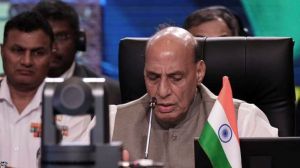Stating that the trial court in Surat had not given reasons for awarding the maximum punishment of two years to Congress leader Rahul Gandhi, the Supreme Court Friday stayed his conviction in a criminal defamation case over his 2019 remarks on the Modi surname.
The decision by the bench of Justices B R Gavai, P S Narasimha and P V Sanjay Kumar, which heard Gandhi’s plea challenging the Gujarat High Court order declining to stay the conviction, paves the way for his return to Lok Sabha where he represented Wayanad in Kerala.

Gandhi was disqualified from the House in March this year following the conviction. Now that a stay has been granted, his disqualification stands revoked. The Lok Sabha Secretariat will have to issue a formal notification reviving his membership to the House.
Story continues below this ad
The Supreme Court bench noted that Gandhi’s remarks were “no doubt… in bad taste” and he should “have been more careful while making the public speech”.
He was found guilty of criminal defamation by a Surat magistrate court in a complaint filed by Surat West MLA Purnesh Modi of the BJP who objected to his remarks in Kolar in April 2019 – in the run-up to the Lok Sabha elections – about thieves with the Modi surname. His appeal against the conviction is pending before the Surat Sessions Court.
The bench said the consequences of being disqualified as a result of the conviction would “not only affect the right of the appellant to continue in public life but also affect the right of the electorate, who have elected him, to represent their constituency”.
Stating that it had considered “certain factors” to “stay the order of conviction during the pendency of the present appeal”, the bench said, “The sentence for an offence punishable under Section 499 of the Indian Penal Code, 1860… is simple imprisonment for two years or fine or both. The learned Trial Judge, in the order passed by him, has awarded the maximum sentence of imprisonment for two years. Except the admonition given to the appellant by this Court in contempt proceedings (in the Rafale matter)… no other reason has been assigned by the learned Trial Judge while imposing the maximum sentence of two years.”
Story continues below this ad
“It is to be noted that it is only on account of the maximum sentence of two years imposed by the learned Trial Judge, the provisions of sub-section (3) of Section 8 of the Representation of the People Act, 1950… have come into play. Had the sentence been even a day lesser, the provisions of sub-section (3) of Section 8 of the Act would not have been attracted,” it said.
It said “when an offence is non-cognisable, bailable and compoundable, the least that the Trial Judge was expected to do was to give some reasons as to why, in the facts and circumstances, he found it necessary to impose the maximum sentence of two years”, noting that “though the learned Appellate Court and the learned High Court have spent voluminous pages while rejecting the application for stay of conviction, these aspects have not even been touched in their orders”.
Earlier, appearing for Purnesh Modi, Senior Advocate Mahesh Jethmalani said the contents of Gandhi’s speech have been established. The man who recorded it, under instruction of the Election Commission to ensure the Model Code of Conduct, is a prosecution witness, he said, adding that there is a plethora of evidence.
Jethmalani said that although Gandhi was admonished by the Supreme Court in the Rafale case, there was no change in his conduct and his intention was to defame every person with the surname Modi, just because it matches that of the Prime Minister.
Story continues below this ad
Appearing for Gandhi, Senior Advocate Abhishek Manu Singhvi denied this and said there is no evidence of the alleged event. He said the complainant got a WhatsApp with a newspaper cutting. “Doesn’t say how he got it or who sent it,” he said.
On what was attributed to Gandhi, Singhvi said, “In democracy, we have dissent. In Hindi, we call this ‘shaleen’ language.” Rejecting the contention on Gandhi’s antecedents, he said though it was held that he committed an offence involving moral turpitude, there was not a single material of moral turpitude.
An immediate consequence of the stay on Gandhi’s conviction is that his disqualification stands revoked. The revocation will take effect from the date of the stay and not when the Lok Sabha Secretariat decides to restore him as MP.
In 2018, the Supreme Court had reiterated its decision that the disqualification “will not operate from the date of order of stay of conviction…” Even the Centre, in an affidavit filed through the Law Ministry, had supported the Court’s decision.
Story continues below this ad
“It is untenable that the disqualification which ensues from a conviction will operate despite the appellate court having granted a stay of the conviction. The authority vested in the appellate court to stay a conviction ensures that a conviction on untenable or frivolous grounds does not operate to cause serious prejudice,” the Court had said. Justice D Y Chandrachud had authored the verdict for a bench that also comprised the then Chief Justice of India, Justice Dipak Misra, and Justice A M Khanwilkar.
The stay will operate until the Surat Sessions Court decides Gandhi’s appeal against the conviction. If the Sessions Court upholds the conviction and the maximum sentence that triggered the disqualification, Gandhi will have to move court again.










